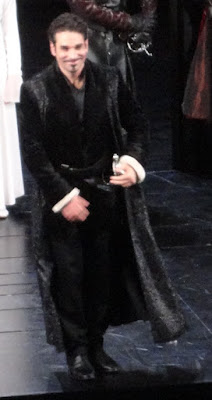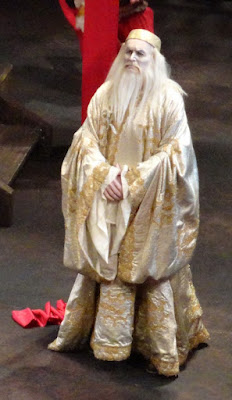(review in English below)
A nova produção
do Otello de Verdi da Royal Opera House
foi já aqui primorosamente descrita. Limitar-me-ei a alguns comentários mais
breves e ao contraste das duas récitas a que assisti, com elencos diferentes.
Antes das
diferenças, em comum tiveram o melhor (a direcção musical superlativa de Antonio Pappano, bem correspondida pela
orquestra e coro),
e o pior, a encenação abstracta de Keith Warner que, num palco quase sempre despido, se baseia no
contraste entre o preto e o branco mas não traz nada de novo.
Na primeira récita:
A estreia do
tenor alemão Jonas Kaufmann como
Otello foi muito boa. É um cantor que muito aprecio, tinha lido algumas
opiniões menos favoráveis mas não as subscrevo, sobretudo nesta récita. As suas
qualidades vocais já foram várias vezes enaltecidas neste blogue. Esteve sempre
ao mais alto nível, foi fantástico no dueto de amor do primeiro acto, muito
credível na evolução dramática ciumenta e desesperada e excelente nos dois
últimos actos.
A Desdemona da
soprano italiana Maria Agresta foi
insuperável. Voz muito bonita, sempre bem audível, afinada e com agudos
estratosféricos. Interpretação superlativa que culminou com uma Ave Maria de arrepiar.
E o barítono
italiano Marco Vratogna foi um Iago
diabólico com uma interpretação superior tanto cénica como vocal. Tem uma voz
cheia, sempre audível sobre a orquestra e de grande expressividade emotiva.
O tenor canadiano
Frédéric Antoun foi um Cassio com
óptima presença em palco e cantou com classe. Tem uma voz de timbre agradável e
sempre bem projectada.
Nos papéis
secundários ouvimos cantores que, apesar de intervenções curtas, também
estiveram muito bem: o tenor neozelandês Thomas
Atkins como Roderigo, a mezzo estónia Kai
Rüütel como Emilia, o baixo coreano In
Sung Sim como Lodovico e o baixo sul africano Simon Shibambu como Montano.
*****
Na segunda récita:
Os três solistas
principais foram outros:
Otello foi
interpretado pelo tenor norte americano Gregory
Kunde. Teve uma interpretação má no início, com notas falhadas, melhorando
nos dois últimos actos mas, ainda assim, aquém do desejável. Cantor de voz
muito poderosa mas não conseguiu expressar de forma convincente o amor por
Desdemona no primeiro acto (o dueto de amor foi francamente mau), seguido de
raiva, ciúme e desespero até final.
A Desdemona da
soprano alemã Dorothea Röschmann foi
também uma desilusão. Tem talvez a voz mais potente de entre todas as que se
ouviram na noite, mas sem agudos musicais, o que a faz gritar constantemente.
Não expressou qualquer subtileza de sentimentos delicados e frágeis característicos
da personagem. Apenas na Ave Maria final
fez algo de interessante.
Finalmente o Rigoletto,
desculpem, o Iago do barítono sérvio Zeljko
Lucic, sendo o melhor dos três, também não foi uma interpretação que fique
na memória. O cantor tem um timbre muito bonito, voz cheia e bem projectada, de
qualidade mantida em todos os registos. Mas faltou-lhe a postura malévola e
intriguista típica da personagem. O Credo
do início do 2º acto foi apenas cantado e não sentido e assim continuou ao
longo de toda a récita.
Os restantes
cantores foram os mesmos da primeira récita e estiveram novamente muito bem.
Para quem assistiu à interpretação da ópera pelos dois elencos encontrou aqui um exemplo perfeito de que cantar alto, em forte, mesmo sem desafinações, não é sinónimo de qualidade interpretativa. Muito pelo contrário, poderá ser uma fuga às dificuldades apresentadas pela subtileza de algumas personagens.
**
OTELLO,
Royal Opera House, London, July 2017
The new
production of Verdi's Otello from the Royal Opera House has already been exquisitely described here. I
will confine myself to a few more brief comments and the contrast of the two
performances I have seen, with different casts.
Before the
differences, in common they had the best (the superlative musical direction of Antonio Pappano, the orchestra and
chorus) and the worse, and abstract staging of Keith Warner that, in a stage almost always naked, is based on the
contrast between the black and the white but brings nothing new.
First performance:
The debut
of German tenor Jonas Kaufmann as
Otello was very good. He is a singer that I really appreciate, I had read some
less favorable opinions but I do not subscribe to them, especially in this
performance. His vocal qualities have already been praised several times in
this blog. He was always at the highest level, he was fantastic in the love
duet of the first act, very credible in the jealous dramatic and desperation evolution
in the last two acts.
Desdemona
by Italian soprano Maria Agresta was
unsurpassed. She has a very beautiful voice, always well audible, tuned and
with stratospheric top notes. A superlative interpretation that culminated with
a shivering Ave Maria.
And the
Italian baritone Marco Vratogna was
a diabolical Iago with a superior performance both scenic and vocal. He has a full
voice, always audible over the orchestra and of great emotional expressiveness.
Canadian
tenor Frédéric Antoun was Cassio
with a great stage presence and sang with class. He has a pleasant, always
tuned voice.
In the
secondary roles we heard singers who, in spite of short interventions, also
performed very well: New Zealander tenor Thomas
Atkins as Roderigo, Estonian mezzo Kai
Rüütel as Emilia, Korean bass In
Sung Sim as Lodovico and South African bass Simon Shibambu as Montano.
*****
Second performance:
The three
main soloists were others:
Otello was
played by American tenor Gregory Kunde.
he had a bad interpretation at the beginning, even with failed notes, improving
in the last two acts but, still, below the desirable. Very powerful voice
singer but could not convincingly express the love for Desdemona in the first
act (the love duet was downright bad) followed by anger, jealousy and
desperation until the end.
Desdemona
by German soprano Dorothea Röschmann
was also a disappointment. She has perhaps the most powerful voice among all
those who were heard that night, but without musical top notes, which made her
scream constantly. She did not express any subtlety of delicate and fragile
feelings characteristic of the character. Only in the final Ave Maria she was interesting.
Finally Rigoletto,
excuse me, Iago of the Serbian baritone Zeljko
Lucic, being the best of the three main soloists, was also not a reference
Iago. The singer has a very beautiful timbre, full voice and with quality in
all records. But he lacked the malicious and intriguing posture typical of the
character. The Credo of the beginning
of the second act was only sung and not felt and so it was throughout the whole
performance.
The
remaining singers were the same from the first performance and they were again
very well.
For those
who witnessed the performances of the opera by the two casts can found here a perfect
example that singing loudly, even without detuning, is not synonymous of
interpretive quality. On the contrary, it may be an escape from the difficulties
presented by the subtlety of some characters.
**
































































